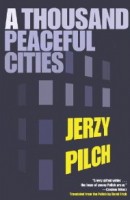 In the third of Pilch’s novels to be translated into English (I recommended the second, The Mighty Angel, earlier this year), the acclaimed Polish author once again writes about an autobiographical character who shares his first name. Jerzy is a teenager in 1963 Soviet-ruled Poland, and he is influenced by the political philosophizing of his father and a friend named Mr. Traba. Matthew Jakubowski says that Peaceful Cities “bears the hallmarks of Pilch’s prose—it is alternately reflective, zany, and gloomy, as he pulls from his own life to create another short yet potent novel.”
In the third of Pilch’s novels to be translated into English (I recommended the second, The Mighty Angel, earlier this year), the acclaimed Polish author once again writes about an autobiographical character who shares his first name. Jerzy is a teenager in 1963 Soviet-ruled Poland, and he is influenced by the political philosophizing of his father and a friend named Mr. Traba. Matthew Jakubowski says that Peaceful Cities “bears the hallmarks of Pilch’s prose—it is alternately reflective, zany, and gloomy, as he pulls from his own life to create another short yet potent novel.”
At the center of the story is Traba’s ridiculous plot to kill the Communist General Secretary, named Gomulka. Jakubowski says this plan “provides the novel’s loose framework, in which Pilch skillfully arranges a series of anecdotes about hopeless political resistance, the Lutheran religious minority in Poland, the mysteries of young love, and rampant alcoholism in Wisla, where Pilch was born in 1952.” (Alcoholism is the central subject matter of The Mighty Angel.) Steven Kellman writes, “Despite the scheme to kill Gomulka, the book is less a political thriller than the story of a boy’s coming-of-age in a goofy household in a broken homeland.” David Ulin says, “the book is a testament to the primacy of art, not violence, in the preservation of a culture.” And like other reviewers, he notes the flair of Traba, who “becomes almost a Falstaffian figure, full of highhanded advice on the art of living, rewarding himself with a drink for each bon mot.”
Kellman writes:
Pilch’s antic sensibility confirms that he is the compatriot of Witold Gombrowicz, the Polish maestro of absurdist pranks. But readers with a taste for the fermented Irish blarney of Flann O’Brien, Samuel Beckett, and John Kennedy Toole might also savor Pilch. Persons attempting to find a motive in this narrative will be perplexed. The assassination of Gomulka, which Mr. Traba calmly discusses with a police investigator who advises him against it, is just a MacGuffin on which to hang digressions on Lutheran theology, Romantic poetry, stained glass windows, and feminine pulchritude.”
A Thousand Peaceful Cities by Jerzy Pilch
Open Letter, 143 pp., $14.95

